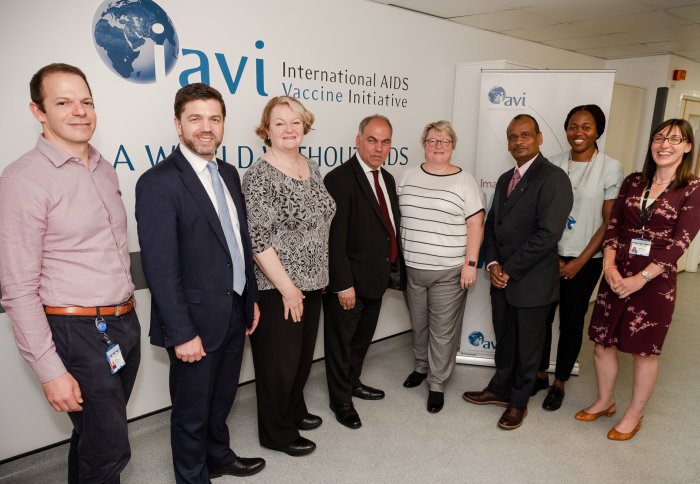Parliamentarians see how Imperial leads AIDS vaccines fight

MPs representing the APPG on Vaccinations for All visited the International AIDS Vaccine Initiative (IAVI) Human Immunology Laboratory (HIL).
The All-Party Parliamentary Group (APPG) Chair Dr Philippa Whitford was joined by fellow MPs Stephen Crabb and Bambos Charalambous at Chelsea and Westminster Hospital last Thursday, as well as colleagues from RESULTS UK, an advocacy group which supports the work of the APPG.
They were welcomed by the HIL team, including Executive Director Professor Jill Gilmour, Senior Director of Global Operations Ali Ebireer, Senior Scientific Director Brian Abel, Postdoctoral Research Fellow Julia Makinde, Advocacy Specialist for IAVI Dan Sharp and Scientific Director Deborah King.
Professor Gilmour outlined the IAVI’s broadening scope, advancing science and providing value for money. She noted that IAVI investment in HIV yields results in science beyond HIV research, unlocking solutions to other diseases. Professor Gilmour emphasized the importance of public sector funding for global health R&D, as well as the benefits it brings, with HIL’s position at the centre of the IAVI network a clear demonstration of scientific excellence in the UK.
The presentation concluded with a warning about the continued challenges posed in vaccination research. Professor Gilmour explained that there were 1.8 million new HIV/AIDS infections, and despite huge progress in recent years, 15 million HIV/AIDs patients do not have access to treatment. More government and industry funding, she explained, was vital to meeting the vaccination challenges of the future.
Progress though collaboration
In a roundtable discussion, the importance of collaboration, among researchers, organisations and countries, was repeatedly highlighted.
Professor Gilmour emphasised the need to provide a translational bridge between academia and industry, delivering a broader global impact. This includes making data more readily available to support drug trials across the world. Philippa Whitford MP agreed, describing the struggles she faced as a young researcher thirty years ago, with competition over grants superseding the sharing of information and a lack of funding for blue-sky research.
Stephen Crabb MP asked about IAVI’s work with countries in both Africa and Europe. The HIL team explained that their efforts in Africa are concentrated in East Africa because the West has fewer incidents of HIV and is already supported by existing UK programmes. On Europe, the team raised concerns about the loss of funding post-Brexit, with Professor Gilmour explaining that most of their funding is from either EU programmes or the US Government, both of which are currently “precarious” as sources.
 Whitford also commentated on the importance of an “educational narrative” on vaccination, noting that childhood vaccination rates were significantly higher in Scotland than in England. The group agreed that educating patients on the importance of vaccinations would be key, alongside future research.
Whitford also commentated on the importance of an “educational narrative” on vaccination, noting that childhood vaccination rates were significantly higher in Scotland than in England. The group agreed that educating patients on the importance of vaccinations would be key, alongside future research.
New technologies driving change
Dr Whitford was given an extensive tour of the IAVI Good Clinical Laboratory Practice (GCLP) facilities. In the Flow Cytometry Suite, she discussed with Imperial’s Dr Lucas Black the technological change that immunology and vaccination research has undergone in recent decades, examining HIV+ blood cells, for example, with a much greater efficiency.
 Dr Black also demonstrated the 10X Genomics machine, which rapidly combines large partition numbers with a massively diverse barcode library to generate more than 100,000 barcode-containing partitions in a matter of minutes, helping to identify antibody-producing cells.
Dr Black also demonstrated the 10X Genomics machine, which rapidly combines large partition numbers with a massively diverse barcode library to generate more than 100,000 barcode-containing partitions in a matter of minutes, helping to identify antibody-producing cells.
Investigating the efficacy of research spending
The Commons Science and Technology Committee is currently running an inquiry into the balance and effectiveness of research spending in the UK, to which the College has made a submission. In its response, Imperial called for investment in science, research and innovation to be balanced “across the research ecosystem from fundamental discovery to applied research”.
The College also emphasised the importance of maximising research impact and return on taxpayers’ investment by allocating research funding based on excellence.
Article text (excluding photos or graphics) © Imperial College London.
Photos and graphics subject to third party copyright used with permission or © Imperial College London.
Reporter
Joe Dharampal-Hornby
Communications and Public Affairs